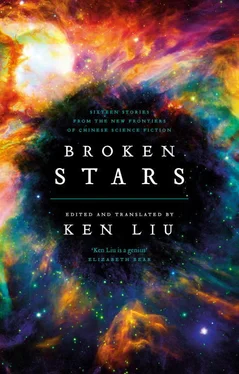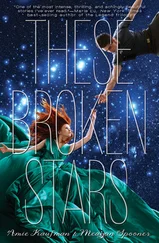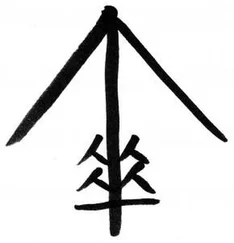The car drove past Tiananmen along the Avenue of Eternal Peace. Under the cold light of the moon, I saw that on this square that had once held tens of thousands of idealistic young hearts, the Great Hall of the People and the Monument to the People’s Heroes had both been reduced to heaps of rubble. A bare flagstaff stood in the middle of the square, but the red flag with five golden stars was no longer flying from it; instead, it lay crumpled on the ground. A few soldiers were working on the Gate of Heavenly Peace itself, taking down the portrait of Chairman Mao so that it could be carried away. I still couldn’t believe I was witnessing the end of the country in which I was born.
I thought I had been through too much ever to be moved by the shifting vicissitudes of fortune. But I was wrong. In that moment, my eyes grew blurry. Tiananmen became an old watercolor painting, dissolving in my hot tears. One time, the entire country celebrated the founding of the People’s Republic with a parade through this very square; one time, students from around the country gathered here to demand democracy; one time, Chairman Mao stood here and surveyed the Red Guards—where were they now? Had it all been a dream?
Equally broken lay the dream of reuniting with Qiqi. I had waited so long in this city for her, but by the time she managed to return to her homeland, in which corner of China would I find myself? Perhaps we would never meet again until death…
No one spoke. The car bumped along and left war-torn Beijing, heading for the Western Hills.
17.
A lamp is lit on the mountain in the east,
The light falls on the mountain in the west.
The plain between them is smooth and vast,
But I can’t seem to find you…
The Loess Plateau of central China lay before us. The yellow earth, deposited by dust storms over the eons, stretched to the horizon. Thousands of years of erosion had carved countless canyons and channels in it, like the wrinkles left by time on our faces. The barren terraced fields bore silent testimony to the hardships endured by the people eking out a living on this ancient land. Baota Mountain, the symbol of the town of Yan’an, stood not far from us, and the Yellow River flowed past the foot of it. The folk song echoed between the canyons, lingering for a long time.
“People enjoy love songs, even in a place like this,” said Heizi. “Oh, do you remember that popular song about the Loess Plateau from when we were young? Back then, I was so curious what the place really looked like. I never got to see it until now, when it’s become my home. Fate is really funny sometimes.”
For the last few years, as the civil war raged on, I had followed the People’s Liberation Army first to Hebei, and then to the liberated regions in the center of the country, and finally here, to Yan’an, where I unexpectedly bumped into my old friend. Heizi had been in the Northeast until he followed his son here, but his wife had died during the Siege of Changchun.
Although the PLA had begun the civil war with a series of crushing defeats, under the leadership of Lin Biao, Peng Dehuai, and Liu Bocheng, the PLA soon rallied and pushed back. Chiang Kai-shek became the President of the Republic of China in Nanjing, but his dream of unifying China couldn’t be realized. The more he tried to “exterminate” the Communists, the more his own hold on power appeared to waver. The Communists managed to hold on to some liberated zones in northern China, and the two sides settled into a seesawing stalemate. Since both factions were tired of the fighting, they declared a cease-fire and began negotiations in Chongqing, hoping to form a new coalition government. But since neither side was willing to compromise, the talks went nowhere.
While China was embroiled in this civil war, extreme militarists came to power in Japan and launched an invasion of China. They advanced quickly and forced Chiang Kai-shek to leave Nanjing and move the capital temporarily to Chongqing. The Japanese then invaded the Philippines and opened a new Pacific front against the American forces stationed there. The Americans were completely unprepared and fled before the might of Japan. In distant Europe, a madman named Hitler rose to prominence in Germany with the support of the army and instantly declared war on the Soviet Union. The German forces reclaimed East Germany and invaded France. The whole world had descended into the first truly global war in history.
The Cold War dissolved before this new threat. The Americans and the Soviets, erstwhile enemies, formed an alliance against the new Axis Powers of Germany, Italy, and Japan. Meanwhile, in China, the Nationalists and the Communists had to put aside their differences to fight together for the survival of the Chinese people against the Japanese slaughter. Thus did history turn over a new page.
After arriving in Yan’an, I didn’t want anything more to do with administration or politics. I dedicated myself to collecting folk songs and preserving traditional arts, which I enjoyed. Although my life was no longer comfortable—I lived in a traditional cave dwelling and subsisted on coarse grains just like all the local peasants—I counted myself lucky. It was a time of war, after all.
While Heizi and I reminisced, a young student ran up the mountainous path toward us.
“Teacher! Someone is here looking for you!” He struggled to catch his breath.
“Who?” I didn’t even get up. I was too old to be excited.
“An old lady. I think she’s from America.”
I jumped up and grabbed him. “An old lady? What’s her name? How old is she?”
“Um… I’m not sure. I guess over sixty? She’s talking with the dean of the Arts Academy. The dean said you know her.”
From America… over sixty… an old lady… my Qiqi. She’s here. She’s finally here!
I started to run. But I was too old; I couldn’t catch my breath and I felt dizzy. I had to slow down and Heizi caught up to me.
“Do you really think it’s Qiqi?” he asked.
“Of course it is. Heizi, slap me! I want to be sure I’m not dreaming.”
Like a true friend, Heizi slapped me in the face, hard. I put my hand against my cheek, savoring the pain, and laughed.
“Don’t get too excited,” said Heizi. “Zhao Qi is your age, isn’t she? She’s not a pretty young lady anymore. It’s been decades since you’ve seen her. You might be disappointed.”
“That’s ridiculous. Look at all of us. We’re like candle stubs sputtering in our last moments of glory. Seeing her one more time before I die would be more than enough.”
Heizi chuckled. “You might be old, but you’re still in good health—I bet the parts of your body that matter still work pretty well. How about this? If you two are going to get married, I want to be the witness.”
I laughed and felt calmer. We chatted as we descended the mountain, and then my heart began to leap wildly again as I approached the Arts Academy.
18.
I didn’t recognize her.
She was Caucasian. Although her hair was turning white, I could tell it had once been blond. Blue eyes stared at me thoughtfully out of an angled, distinctive face. Although she was not young, she was still beautiful.
I was deeply disappointed. That foolish student hadn’t even clarified whether he was talking about a Chinese or a foreigner.
“Hello,” the woman said. Her Chinese was excellent. “Are you Mr. Xie Baosheng?”
“I am. May I ask your name?”
“I’m Anna Louise Strong, a writer.”
I recognized the name. She was a leftist American author who had lived in Beijing and written several books about the China of the Mao era. She was friends with both Mao Zedong and Zhou Enlai. Though I knew who she was, I had never met her. I heard she had moved back to the US around the time Shen Qian died. Why was she looking for me?
Читать дальше












